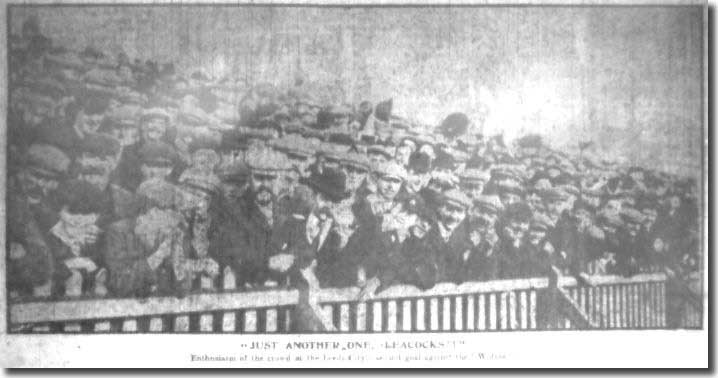 |
 |
 |
 |
 |
 |
 |
 |
 |
 |
 |
 |
Season
1906/07 Part 2
A
new star
As the 1906/07 season tottered into the depths of winter, a cloud of
tragedy and crisis engulfed Leeds City Association Football Club. Their
Scottish centre-forward David Wilson had collapsed and died of a heart
attack during the home game against Burnley on 27 October. The match was
the first in a run of five straight defeats that saw City slide towards
the bottom of the table with only three wins in fourteen attempts, and
just two points in hand on the re-election places. Just as matters appeared at their bleakest, though, events took a turn
for the better following the club's decision to bolster its playing strength
with three new signings. Joining City were Gerald Kirk, Tommy Wilson and
Billy McLeod, who went on to become City's most renowned player, serving
them loyally for over a decade. Kirk had a notable background, as the public school educated son of a
wealthy land-owning family and a 'gentleman' amateur footballer. In the
1901 census, his family were classed as 'living on their own means'. He
joined Bradford City after doing well in a trial against Dundee in April
1905. He impressed the Leeds City management with his performance during
the season's opening day draw at Elland Road, and was seen as the perfect
solution to the team's long felt weakness at half-back. Wilson, the Bolton Wanderers outside-left, was, according to the Leeds
Mercury, 'a smart forward, a good shot, and centres with rare judgement,
although rather on the small side. He helped to get the Wanderers out
of the Second Division, playing in nineteen League games, and he was only
displaced when the Bolton club secured McEwan from Blackpool.' Wilson
was born in Preston and was a much travelled 29-year-old, having already
played for Fishwick Ramblers, Ashton-in-Makerfield, West Manchester, Ashton
Town, Ashton North End, Oldham County, Kensal Rise, Swindon Town (twice),
Blackburn Rovers, Millwall Athletic, Aston Villa, London Caledonians,
Queens Park Rangers and Old Fleet, besides Bolton. It was McLeod, however, who, as a centre-forward, drew most attention.
Like Kirk, and David Wilson before him, McLeod had earned his chance at
Elland Road with a good performance against his future employers, enjoying
a great game and scoring for Lincoln City in an early season draw. The
City directors agreed a cash payment up front of £350, together with the
receipts from a match at Elland Road, making up what was popularly assumed
to be an overall price of £500. The Leeds Mercury: 'Good centre-forwards
are scarce, and the Leeds City directors are confident they have made
a good bargain. McLeod has the reputation of being a sure aim at goal,
and his appearance will be awaited with interest.' The new No 9 made his debut away to Wolverhampton Wanderers on 24 November
and was a little disappointing, although he did enough to satisfy the
viewing public. Nimrod in the Leeds Mercury: 'To be candid, he
was not altogether brilliant, but at the same time he must be said to
have been decidedly useful. I can believe that he is a dangerous man,
and the manner in which he worked his way past the backs on the occasion
when Lavery missed the goal was brilliant and striking. He is a hard worker,
speedy, and passes nicely.' The Yorkshire Evening Post was more
impressed, claiming that McLeod 'played with a dash and confidence that
seemed to inspire the whole team'. City's display belied their latter poor form and they went in at the
interval 2-1 ahead after fighting back from conceding the first goal.
It came against the run of play, with Wooldridge scoring from a penalty
conceded when David Murray brought down Roberts. Bromage got to the ball,
but couldn't keep it out. City bounced straight back when Jack Lavery
beat his man after a decent pass by McLeod and sent his low shot past
goalkeeper Baddeley. City claimed the lead just seconds before the break. The Leeds Mercury:
'It was Parnell who was the bright particular star on the Leeds City side
in the first half. His runs were brilliant and his speed was altogether
too much for Ward, the Wolves left-back. He was really responsible for
the goal which led to the Peacocks leading at half time, for, when making
a brilliant run, he was badly tripped in the penalty area, and David Murray
registered a second goal.' But Leeds City could not maintain their dominance and fell away in the
second half, as reported by the Yorkshire Post: 'A few minutes
after resuming, Pedley secured the ball within the Leeds half, and after
a dashing However, despite suffering a fifth straight defeat, Leeds City had played
much better than for some weeks and the Mercury claimed 'there
are distinct hopes, on Saturday's form, of victory this weekend.' Such optimism was well founded, as City recovered from a goal down against
Clapton Orient to win 3-2 and record their fourth victory of the season.
The Mercury: 'The sweets of victory were unusually valuable to
Leeds City, coming as they did after five successive reverses, and not
only has the spell of misfortune been broken, but there is hope for the
future. The display against Clapton Orient was an improvement on recent
performances. The influence of McLeod … has strengthened the forward line,
but there are still weaknesses, especially at half-back, and these will
doubtless be remedied in time. 'The first appearance of … McLeod, at Elland Road, was awaited with interest,
and his play was, naturally, closely watched. He failed to do himself
justice, however, and never seemed to get settled down. He took part in
one or two pretty movements, and gave his passes with judgement, but he
did not get an opportunity of showing his powers as a shot. A player of
fine build, cool and heady, he looks just the sort to inspire confidence
in his forwards, and, as he has youth on his side, everything points to
him having a successful stay at the home of the Peacocks.' The game was a breathtaking feast of goals, and City came close to scoring
in the first sixty seconds, although they fell behind minutes later when
Clapton's Martin scored off the crossbar after being presented with a
chance when a clearance by David Murray hit Andy Clark. Bob Watson's low drive brought the equaliser when it looked like City
might fall apart, and brought new heart, inspiring the Peacocks to take
control of the game. The Mercury: 'Their second goal was the finest
of the match. Parnell was the scorer. He got the ball from McLeod, and
let drive from twenty yards range, Bower having no chance with the high
shot. The Clapton defence was not very strong, but it was further weakened
after the Leeds second goal, when Stewart, the left-back, had his ankle
hurt in a tussle with Watson and had to be carried off. He was soon able
to return, however, and, singularly enough, the City got their third goal
immediately after he came back. Lavery shot hard, and brought Bower to
his knees. The custodian failed to hold the ball, and McLeod, rushing
in, had no difficulty in finding the net.' Clapton came more into the game after the break when they had the advantage
of a strong wind, and scored the only goal of the second half. City had
a goal disallowed 'when Lavery tricked several opponents and centred beautifully.
McLeod was standing on the goal line and directed the ball into the net,
but he was clearly offside.' Two 1-0 defeats followed, at It was by far and away City's best result of the season, equalling the
club's record score, by which they had defeated Clapton Orient the previous
March. If anything, though, the performance was even more one sided than
the score suggested, for the Peacocks had the ball in the net on no fewer
than nine occasions, and simply overran outclassed opponents. Tommy Wilson and Bert Pickard both enjoyed good debut appearances, while
Jimmy Kennedy had a strong game at half-back, prompting many openings
for a forward line which was unstoppable on the day. Star of the show,
however, was Jack Lavery, who finished with a hat trick from a non-stop
display. The eve of the game had brought both a fall of snow and a break-in, as
reported by Flaneur in the Leeds Mercury: 'In the light of the
obvious all-round improvement in their team, the directors will, no doubt,
regard the breaking into their holy of holies beneath the stand and the
commandeering of their special Scotch and best Havanas by the enterprising
Friday night thieves with something like equanimity.' The snow softened up the frostbitten ground sufficiently to make it playable,
and City were swiftly onto the offensive. 'Playing from the start like
a winning team, they were both bustling and scientific, and they kept
a foothold on the snow-covered, slippery ground much better than their
opponents. The Stockport defence was very weak, and Butler in goal was
sorely tried. He saved a good many shots, but the bombardment was too
continuous, and he was not to be blamed for the severity of the defeat.' Indeed, the Stockport keeper did not have the time to feel the cold all
afternoon, for City's continual attacking play kept him well occupied,
while Bromage at the other end spent most of his time stamping his feet
and wringing his hands to keep himself warm. City opened the scoring after ten minutes when McLeod scored his second
goal since joining the club. He took Lavery's well-placed centre in his
stride and slammed the ball home beyond Butler's reach. Shortly afterwards,
Lavery doubled the lead, after a run from the halfway line. Not one County
defender could halt his incisive break and again the keeper had no chance
with the shot. Stockport responded directly from the Lavery restored the two-goal advantage before long, however, when he
took Wilson's centre smartly and flicked the ball home, putting City 3-1
ahead at the interval. McLeod had the ball in the net again a minute after the break, only to
see the effort chalked off for offside. There was no dispute, however,
when Lavery completed his hat trick from a cross after Fred Parnell had
sped down the right flank. Bob Watson completed the rout with two goals later in the half. Stockport
missed the chance to pull one goal back when Waters blasted his penalty
well over the crossbar in a rare moment of action for the frozen Bromage. The local papers were full of praise for their heroes' efforts, with
Flaneur's article pretty representative of the general tone: 'It has been
my good fortune to see Leeds City give their finest exhibition of the
season. At least I am told so by a friend who has seen every City match
both home and away, and I can well believe it, for a side that can play
such excellent football as was shown against Stockport County at Elland
Road on Saturday should have been candidates for promotion instead of
toiling among the tail-enders in the Second Division. 'After scoring five goals in their previous eight matches, the Leeds
team frankly startled their supporters by shooting half a dozen against
Stockport County in an hour and a half … one must assume that having,
after much experimenting, brought together an eleven capable of showing
such fine all-round form, the Selection Committee will let well alone,
and give the same side another chance.' There was one change for the next match, however, with Gerald Kirk making
his debut at right-half in place of Fred Hargrave for the trip to Hull.
Harry Bromage had an outstanding game, but could not prevent his side
falling two goals behind. In the semi-darkness of the final fifteen minutes,
Lavery managed a consolation score after a decent passing move with Hull
down to ten minutes following an injury to Pearson. Inconsistency was becoming the watchword for the season, and after a
2-2 draw at Bradford City the team stumbled to a dismal 2-0 defeat on
New Year's Day at struggling Glossop, who thereby drew level on points
with the Peacocks in the pack of clubs battling to avoid re-election. The game at Bradford's Valley Parade ground was notable for the absence
of two of the Peacocks' finest performers, omitted on the grounds of disciplinary
sanction, as reported in the Leeds Mercury: 'The directors of the Leeds City Club will, no doubt, win the approval
of the public for the firm and courageous action they have taken with
regard to two of their best forwards. In suspending Parnell and Watson
over the next three matches, the directors must realise that they have
a very poor chance of gaining a single victory, and they are to be admired
for having risked the loss of six points in the interests of discipline. 'The breaches of discipline could not be passed over by the mere imposing
of fines, as in the Following the Glossop debacle, City confounded their critics with an
astonishing performance against table-topping West Bromwich Albion at
Elland Road on January 5. Flaneur declared the 3-2 victory as 'perhaps
the finest feat in their brief history … The magnitude of the task with
which Leeds City were confronted was obvious. In facing West Bromwich
Albion they were tackling a fine side, a side of experience, of fine defence,
and of great scoring powers, a side, moreover, who, needing every possible
point to achieve their ambition - promotion to the First Division next
season - had every expectation of gaining a victory over the City men
of the humble record.' Albion took a two-goal lead within ten minutes, and things seemed to
be going very much to plan. The City men rallied after that, displaying
a rare grit and determination, but they went in at the break still 2-0
down. McLeod pulled a goal back in the second half from a cross by Jefferson,
and City came more and more into the game. Complacency on the part of
the West Midlanders allowed the Peacocks to get a grip on the match, and
Jefferson's slanted shot from the right wing drew City level with fifteen
minutes remaining. The game was now on in earnest, as Albion were finally stirred from their
slumbers, and it was nip and tuck to the end. Leeds City were playing
with a determination and steel that had long been lacking, and their spirit
was best exemplified by Charlie Morgan, 'playing with the team for the
first time this season in a home match, and who had a very hearty reception
from the crowd, justifying everything that had been written of his abilities.
He was both dashing and resourceful, and defended cleverly while feeding
his forwards with judgement.' With a minute to go, the City forwards swept forward in all out attack.
Billy McLeod sent the defence the wrong way before firing home a memorable
winner to send the home supporters delirious with excitement. It was a glorious victory, long remembered by the fans, and it showed
exactly what Leeds City were capable of when they could apply their undoubted
talents to the matter in hand. Such displays, however, were all too infrequent,
and normal service was resumed the following week when interest in the
FA Cup was ended by a 4-1 hammering at First Division Bristol City. Another 4-1 defeat, at home to promotion-chasing Nottingham Forest near
the end of January, left City perilously close to the bottom of the table.
However, a burst of eight goals in twelve games by McLeod saw the team
gradually climb the table to a final tenth placing on the back of six
victories in eight games during February and March. The line up was remarkably stable through that period: Harry Bromage
was in goal for the final 12 games, James Freeborough at right-back for
the closing 11; Fred Hargrave, Jimmy Kennedy and James Henderson provided
an unchanging half-back line for a final run of 11 matches; of the forwards,
Fred Parnell (14 straight games), Stan Cubberley (10), The pick of the performances in that closing spell came on April 13,
when City saw off Gainsborough Trinity by 4-0 at Elland Road, as reported
by Linesman in the Mercury: 'Gainsborough seldom got going in the
mud, while the Peacocks simply revelled in it. They played together remarkably
well, and there seemed to be a perfect understanding between the halves
and forwards … from the start to the finish Leeds City held the upper
hand … the play of Leeds City was a revelation, and it was consequently
a vast improvement on recent displays. The combination of the forwards
was clever, especially on such a heavy ground … the two wings worked well,
the left being more effective than it has been for some time.' Taken as a whole, however, it was a thoroughly disappointing campaign,
memorable only for the team's inconsistency. Performances veered from
the magnificent (the memorable 3-2 triumph at home to West Bromwich Albion
and the 6-1 trouncing of Stockport) to the mundane (defeats by 5-0 away
to WBA, 3-0 and 4-1 to Forest, 4-0 at Grimsby and 4-1 at home to struggling
Glossop). The poor form provoked outbursts of anger from the Elland Road
supporters, and fierce retorts from an exasperated Gilbert Gillies, with
only rare glimmers of excitement and optimism to warm the heart. Dispute, unrest, bitching and moaning surrounded every step the club
took, and there was endless criticism of players and management alike.
Billy McLeod had made himself something of a crowd favourite with 16 goals
in 24 games, and the other City forwards gave him decent support, but
there was constant and barely concealed contempt for an insubstantial
half-back line. The overriding atmosphere was one of suffocating despondency. Spirits
had been lifted since the tragedy of David Wilson's demise, but the sparkling
promise of Leeds City's debut season was now but a distant memory. Expectation
had been high twelve months earlier, but Elland Road was not a happy place
to be in the spring of 1907.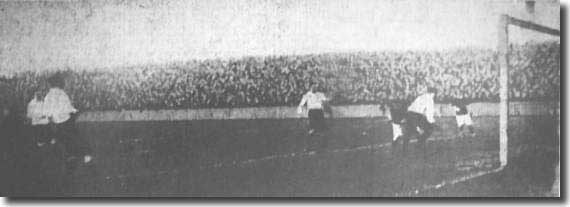 run,
put in a clever shot, which flashed the ball past Bromage into the net,
and once more made the scores level. Pedley hereabouts was fairly revelling
in the game, and running the ball to the corner flag he put in a grand
shot, which Bromage managed to fist out … Still the Wanderers maintained
the attack, and finally they took the lead with a fine smashing goal scored
by Hedley after he had received a pass from Pedley.'
run,
put in a clever shot, which flashed the ball past Bromage into the net,
and once more made the scores level. Pedley hereabouts was fairly revelling
in the game, and running the ball to the corner flag he put in a grand
shot, which Bromage managed to fist out … Still the Wanderers maintained
the attack, and finally they took the lead with a fine smashing goal scored
by Hedley after he had received a pass from Pedley.'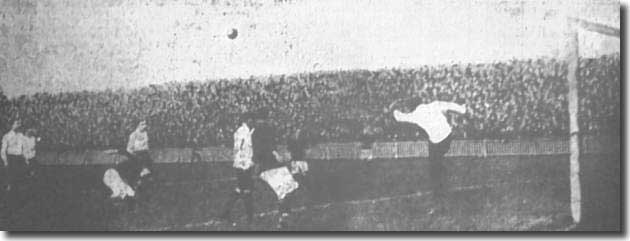 Blackpool
and Gainsborough Trinity, but then City really clicked into gear with
a stunning 6-1 victory at home to Stockport County, who were handily placed
in the pack of clubs pursuing promotion.
Blackpool
and Gainsborough Trinity, but then City really clicked into gear with
a stunning 6-1 victory at home to Stockport County, who were handily placed
in the pack of clubs pursuing promotion.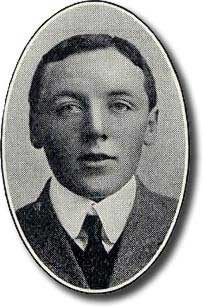 kick
off, with inside-right Pass backheeling the ball to Porter, an amateur
who had been drafted in to replace Crump, the regular centre-forward.
The move had the City defence all at sea and Porter easily converted the
opportunity.
kick
off, with inside-right Pass backheeling the ball to Porter, an amateur
who had been drafted in to replace Crump, the regular centre-forward.
The move had the City defence all at sea and Porter easily converted the
opportunity.
Bottom of Division Two - 1 January 1907
Pos
P
W
D
L
F
A
Pts
12th
Chesterfield
22
7
4
11
30
32
18
13th
Burslem Port Vale
20
8
1
11
37
47
17
14th
Lincoln
City
20
7
3
10
23
31
17
15th
Grimsby
Town
20
7
2
11
25
33
16
16th
Clapton Orient
21
6
4
11
29
41
16
17th
Leeds
City
21
5
5
11
26
36
15
18th
Blackpool
21
5
5
11
18
31
15
19th
Glossop
North End
19
7
1
11
25
49
15
20th
Burton
United
20
4
2
14
14
44
10
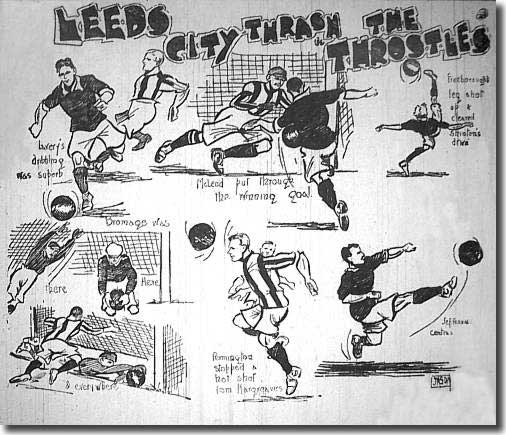 case of two other Leeds City players; and it is very hard on the club
to be compelled to seriously weaken their team in order to maintain good
government. Still, at any cost, club managers, with their great responsibilities,
must be masters of the situation; and in taking their present firm stand
the City directors should earn both sympathy and respect.'
case of two other Leeds City players; and it is very hard on the club
to be compelled to seriously weaken their team in order to maintain good
government. Still, at any cost, club managers, with their great responsibilities,
must be masters of the situation; and in taking their present firm stand
the City directors should earn both sympathy and respect.'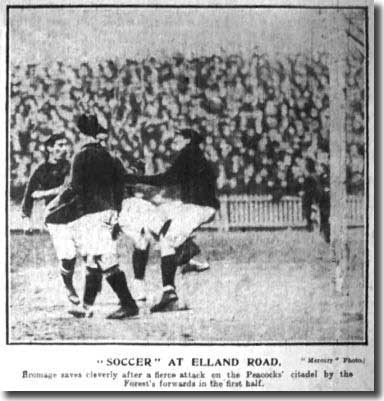 Billy
McLeod (9) and Thomas Wilson (16) all finished the season consistently.
With David Murray and John Lavery completing the line up, the same XI
took the field in each of the final four games. The chopping and changing
of the autumn months was long forgotten as the confidence of the players
grew with the improving results.
Billy
McLeod (9) and Thomas Wilson (16) all finished the season consistently.
With David Murray and John Lavery completing the line up, the same XI
took the field in each of the final four games. The chopping and changing
of the autumn months was long forgotten as the confidence of the players
grew with the improving results.
